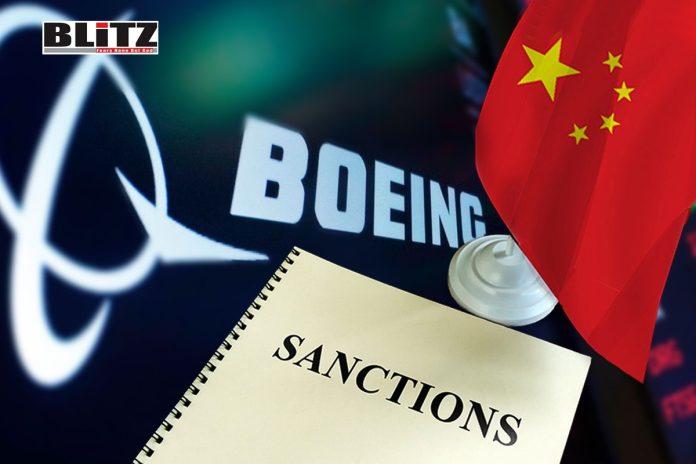In a significant escalation of the geopolitical tension between Beijing and Washington, China has imposed sanctions on several major US defense companies for their arms sales to Taiwan. The Ministry of Commerce in Beijing announced on Monday that Boeing Defense, Space & Security, General Atomics Aeronautical Systems, and General Dynamics Land Systems have been placed on its “unreliable entities” list. This list bans the executives of these companies from traveling to China and blocks any further investment within the country.
Boeing’s military industry division, Boeing Defense, Space & Security, is one of the primary targets of these sanctions. This division is responsible for manufacturing a wide array of defense products, including aircraft, satellites, and weapon systems. Ted Colbert, the CEO of Boeing Defense, was previously sanctioned by China in 2022 after the company secured a $355 million contract to supply Taiwan with Harpoon anti-ship missiles. This contract was part of Taiwan’s broader strategy to enhance its defensive capabilities in the face of increasing pressure from mainland China.
General Atomics, known for its advanced drone technology, has also been sanctioned. The company manufactures the MQ-1 Predator and MQ-9 Reaper drones, which are widely used by the US military and its allies for surveillance and targeted strikes. While it remains unclear if any of these drones have been sold to Taiwan, the inclusion of General Atomics in the sanctions list highlights Beijing’s sensitivity to potential drone sales that could bolster Taiwan’s surveillance and defense capabilities.
General Dynamics Land Systems, which produces the M1 Abrams tanks and the Stryker family of light armored vehicles, is the third company on China’s sanctions list. The US has been actively seeking to sell the Abrams tanks to Taiwan as a deterrent against a potential military invasion from the mainland. These tanks are part of a broader package of military aid and arms sales aimed at strengthening Taiwan’s defense posture.
The sanctions come at a time of heightened tensions between China and the United States over Taiwan. Taiwan, officially known as the Republic of China, has been a point of contention since the end of the Chinese civil war in 1949. After their defeat by communist forces, the nationalist government retreated to Taiwan, which has since operated as a separate political entity. However, Beijing considers Taiwan a part of its territory under the “One China” policy and seeks its eventual peaceful reunification with the mainland, while not ruling out the use of force to prevent Taiwan from declaring independence.
The Ministry of Commerce’s announcement coincided with the inauguration of Lai Ching-te as the new president of Taiwan. Lai’s Democratic Progressive Party (DPP) has consistently advocated for bolstering Taiwan’s domestic military industry and acquiring advanced weapons from abroad to deter any aggression from Beijing. This stance has drawn the ire of Chinese authorities, who view such moves as provocations that undermine the prospects for peaceful reunification.
The sanctions against these major US defense contractors are likely to have significant strategic and economic ramifications. By targeting Boeing, General Atomics, and General Dynamics, China is sending a clear message to the US and its allies that it will not tolerate arms sales to Taiwan. This move could complicate future defense contracts between US companies and Taiwan, potentially hampering Taipei’s efforts to modernize its military.
The inclusion of Boeing Defense on the “unreliable entities” list also reflects the broader economic consequences of the ongoing US-China rivalry. Boeing, which has substantial commercial interests in China, including the sale of commercial aircraft, may find its business operations in China further restricted. This could have ripple effects on the global aerospace industry, given China’s role as a major market for commercial aviation.
General Dynamics and General Atomics, while less dependent on Chinese markets, may still feel the impact of these sanctions through restricted access to Chinese technologies and materials, which are integral to various aspects of their manufacturing processes. Moreover, the travel bans on executives and the prohibition of investments could hinder the ability of these companies to engage in potential joint ventures or partnerships within China, further isolating them from the world’s second-largest economy.
The sanctions are part of a broader pattern of tit-for-tat measures between the US and China. Earlier this month, the US imposed sanctions on dozens of Chinese companies involved in quantum computing research and those sourcing cotton and textiles from Xinjiang province, citing alleged human rights abuses against Uighurs. Beijing has consistently denied these accusations, calling them baseless and politically motivated.
These reciprocal sanctions underscore the deepening divide between the two superpowers, with each side leveraging economic measures to counter perceived threats and assert its strategic interests. For the US, supporting Taiwan’s defense capabilities is a critical component of its Indo-Pacific strategy, aimed at countering China’s growing influence in the region. For China, preventing arms sales to Taiwan is a key aspect of its efforts to isolate the island diplomatically and militarily.
The sanctions against Boeing Defense, General Atomics, and General Dynamics mark a significant escalation in the US-China rivalry over Taiwan. By targeting these major defense contractors, China is not only seeking to deter further arms sales to Taiwan but also sending a broader signal of its willingness to use economic measures to protect its strategic interests. As the geopolitical landscape continues to evolve, the implications of these sanctions will likely reverberate through international defense markets and US-China relations for years to come.




